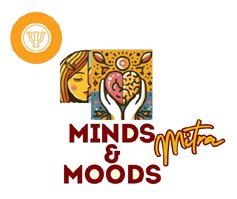Mending Bonds: A Guide to Relationship Counselling 🫂
Relationships, whether with a partner, family member, or friend, are a cornerstone of our lives. But they also require work, and when communication breaks down, it can lead to conflict, misunderstanding, and emotional distance. Relationship counselling, also known as Marriage counselling or Couple therapy, is a powerful tool to navigate these challenges, helping individuals and couples to reconnect and build stronger, healthier bonds. This form of Personal counselling provides a neutral space to address issues, understand each other’s perspectives, and learn effective communication strategies.
Meet Rrimi Bodalkar: A Compassionate Expert in Nagpur
For those in Nagpur seeking professional guidance, Rrimi Bodalkar is a highly recommended Sr. Psychotherapist / Mental Health Counsellor. Holding an M.A. in Psychology (Counselling) and a PGDMH (Clinical), she is also an NSDC Certified Psychometric Analysis & Learning Style Assessment specialist. Her expertise includes specializations in CBT, REBT, and DBT, making her adept at treating a wide range of issues from Mood disorder interventions and Personality development counselling to PTSD counselling and Trauma therapy. She is committed to providing personalized care and creating a supportive environment for individuals, couples, and families to address their mental health concerns.
Symptoms and Causes of Relationship Stress
Recognizing the signs of a struggling relationship is the first step toward seeking help. These symptoms can manifest in various ways, from overt conflict to quiet withdrawal.
Symptoms:
- Communication breakdown: Frequent arguments, lack of open conversation, or passive-aggressive behavior.
- Emotional distance: Feeling disconnected, a lack of intimacy, or a sense of loneliness within the relationship.
- Loss of trust: Issues stemming from infidelity, dishonesty, or broken promises.
- Increased stress and anxiety: The relationship becomes a source of Negative thinking and emotional distress, impacting other areas of life like Workplace stress or Academic stress.
- Unresolved conflicts: Issues from the past continue to resurface, leading to a cycle of arguments without resolution.
Causes:
Relationship issues can stem from a variety of sources:
- Life transitions: Major changes like moving, having a child, or career shifts can strain a relationship. This can be addressed through Life transition counselling.
- Financial disagreements: Differing attitudes toward money can be a significant source of conflict.
- Lack of intimacy: Emotional and physical intimacy are crucial, and a decline in either can cause a rift.
- Differing values or goals: A misalignment in future plans or core beliefs can lead to long-term conflict.
- External pressures: Stress from family, work, or social situations can bleed into the relationship, causing tension.
The Therapeutic Process in Relationship Counselling
The procedure for relationship counselling is tailored to the unique needs of the individuals involved. A trained Psychotherapist, Mental Health Counsellor, or Psychologist facilitates the process, which typically involves:
Initial Assessment: The counsellor meets with the individuals together and sometimes separately to understand the history of the relationship, the specific issues, and each person’s perspective.
Goal Setting: The counsellor and clients work together to define clear, achievable goals for therapy. This may include improving communication, rebuilding trust, or managing anger.
Therapeutic Interventions: The counsellor utilizes various evidence-based therapies to help clients achieve their goals. Common approaches include:
- Cognitive Behavioral Therapy (CBT): To identify and change Negative thinking patterns and behaviors that harm the relationship.
- Rational Emotive Behavior Therapy (REBT): To challenge irrational beliefs that lead to conflict.
- Dialectical Behavior Therapy (DBT): To help clients regulate their emotions and improve interpersonal skills.
- Behavioral therapy: To focus on changing specific behaviors that contribute to the problems.
Skill Building: The therapist teaches practical skills like active listening, conflict resolution, and Confidence building to empower the couple to handle future challenges on their own.
Frequently Asked Questions (FAQs)
Q1: When should we consider relationship counselling?
A: It’s a good idea to seek counselling when communication has broken down, arguments are frequent, you feel emotionally distant, or if you’re dealing with major life stressors that are impacting your relationship. Anger management counselling can also be a part of this process if anger is a key issue.
Q2: Can relationship counselling save a relationship?
A: Counselling is not a guaranteed fix, but it provides the tools and support needed for both parties to work on the relationship. It’s most effective when both individuals are committed to the process.
Q3: Can a single person attend relationship counselling?
A: Yes. A single person can benefit from counselling to address relationship patterns, prepare for a new relationship, or cope with a breakup. Personal counselling can help an individual understand their own role and needs in a relationship.
Q4: Can a counsellor help with parenting issues?
A: Yes, many therapists specialize in family dynamics. A Parenting support counsellor can help parents with communication, setting boundaries, and understanding their child’s needs, especially if they have unique needs that require a Child psychologist or Support for special needs children.
Q5: What’s the difference between relationship counselling and marriage counselling?
A: These terms are often used interchangeably. Relationship counselling is a broader term that applies to any type of relationship, while Marriage counselling specifically refers to counselling for married couples. The principles and techniques are largely the same.

